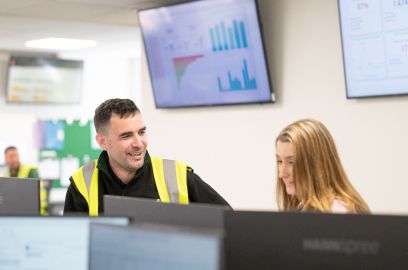
Sustainability roadmap
Our sustainability progress and future goals
Critical to our success in meeting our overall ESG target of meeting net zero by 2040 is collaboration between our businesses and key stakeholders. Our focus in the next reporting period will be to define key milestone targets and start to understand how we define and measure our Scope 3 emissions.
2025
Where are we now?
- Committed to four long-term ESG ambitions including a net zero target.
- Enhanced reporting of our key ESG reporting measures across four strategic objectives.
- Specific ESG initiatives developed.
- Development of the measurement of our metrics.
- Continuation of the ESG Steering Committee.
- Enhancement of our CFD disclosures.
- Introduction of our Group-wide Supplier Code of Conduct.
- Continued improvement of our near miss reporting and in embedding a culture of safety.
- Measurement of employee and customer NPS score.
Key achievements
- A renewed focus on health and safety following the successful recruitment of a Group HR Director. Health and safety teams across the businesses are now working in close collaboration to drive a refreshed strategy and improve the score of key safety metrics. A near miss reporting tool has been rolled out successfully across the Group to support this.
- We have measured the diversity of our colleague population to support with the creation of a diversity and inclusion policy.
- 100% of our fleet met EURO 6 standards.
2026/2027
What will we do over the next two years?
- Continue to roll out a health and safety strategy.
- Deliver a robust management training programme to all levels of our manager colleagues throughout the Group.
- Development of our CFD disclosures, including a quantified scenario analysis as we better understand the financial implications of the risks facing the business.
- Embed ESG initiatives within the NWF business model.
- Continued investment in fleet and trialling of emerging technologies.
- Updating of our diversity and inclusion policy.
- Implementation of new learning and development programmes for our people.
Key targets
- Aim to reduce number of road accidents, lost time injuries and RIDDORs from current reported metrics, embedding a behavioural safety approach to encourage positive, open dialogue about safety in all our operations.
- Maintain and improve OTIF scores and, having provided our Supplier Code of Conduct to our suppliers, ensure this is maintained and provided to all new suppliers.
- Roll out further employee engagement surveys and identify key areas to improve employee satisfaction and wellbeing. Develop our diversity and inclusion strategy. Set a target for our net promoter score by business.
- Focus on driver behaviour to improve miles per gallon (‘MPG’).
2028
What are our medium-term commitments and ambitions?
- Improve standards and policies, risk assessments and collaboration with our supply chain to maximise positive
impacts for our stakeholders. - Broaden our training and professional development programmes and wider employee wellness initiatives.
- Continue to invest in the latest truck technology and fuel sources, and plan for renewable energy transition.
2020 baseline metrics
- 1,517 driver training hours. Improved to 9,595 in 2025.
- 17 RIDDORs. Now at 8 at 31 May 2025.
- 18 Feeds Academy trainees. Total trained to date 51.
Re-based emissions metrics
- Total emissions of 1.876 million tCO2e at 31 May 2025. Increased by 0.5% since 2024.1
- 5,197 tCO2e/commercial vehicle at 31 May 2025, reduced by 6.2% since 2024.1
- 1,082 t/CO2e/1,000sq ft of warehouse and office space at 31 May 2025, decreased by 12.6% since 2024.1
- Emissions data now includes Scope 3. The 2020 baseline has not been re-stated for Scope 3 such that the measures above are against the previous year.
- tCO2e/year defined as tonnes of CO2 equivalent per year.


